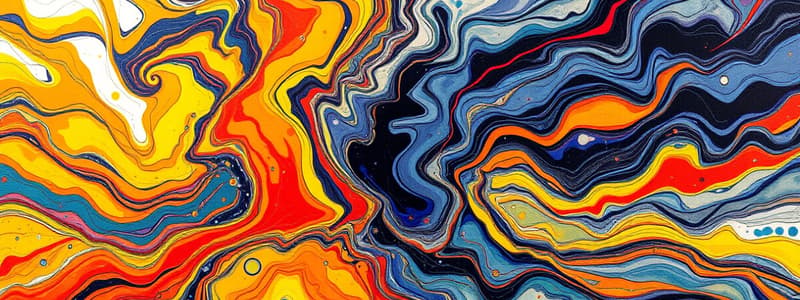Podcast
Questions and Answers
What does Boyle's Law state?
What does Boyle's Law state?
If the volume of a container of gas is decreased, the pressure on the gas will increase if the temperature does not change.
What is Bernoulli's Principle?
What is Bernoulli's Principle?
As the velocity of a fluid increases, the pressure exerted by the fluid decreases.
What does Pascal's Principle state?
What does Pascal's Principle state?
Pressure applied to a fluid is transmitted unchanged throughout the fluid.
What does the Kinetic Theory of Matter describe?
What does the Kinetic Theory of Matter describe?
What does Charles' Law indicate?
What does Charles' Law indicate?
What does Archimedes' Principle explain?
What does Archimedes' Principle explain?
What are two properties of amorphous solids?
What are two properties of amorphous solids?
Why is water unusual in terms of thermal expansion?
Why is water unusual in terms of thermal expansion?
Why does water behave unusually as temperature drops?
Why does water behave unusually as temperature drops?
Why does water's boiling point decrease with increases in elevation?
Why does water's boiling point decrease with increases in elevation?
Flashcards are hidden until you start studying
Study Notes
Gas Laws
- Boyle's Law: When the volume of a gas container decreases, the pressure of the gas increases, assuming temperature remains constant.
- Charles' Law: The volume of a gas increases with increasing temperature while keeping the pressure constant.
Fluid Dynamics
- Bernoulli's Principle: Higher fluid velocity results in lower pressure exerted by the fluid, explaining various fluid flow phenomena.
- Pascal's Principle: Any pressure applied to an enclosed fluid is transmitted undiminished throughout the fluid, essential in hydraulic systems.
Properties of Matter
- Kinetic Theory of Matter: Matter is composed of tiny, constantly moving particles, foundational for understanding states of matter.
- Archimedes' Principle: An object submerged in a fluid experiences a buoyant force equal to the weight of the displaced fluid, relevant in fluid mechanics.
Specific Properties of Solids and Liquids
- Amorphous Solids: Lacking a definite melting point or structured arrangement, leading to isotropic properties.
- Thermal Expansion of Water: Unique due to hydrogen bonding, which promotes cohesion, causing unusual expansion characteristics when transitioning from liquid to solid.
Behavior of Water
- Water molecules adopt a structure that leaves empty spaces as temperature decreases, resulting in expansion when freezing, contrary to most substances.
- Boiling Point and Elevation: As elevation increases, atmospheric pressure decreases, causing the boiling point of water to lower since less energy is required to move particles apart.
Studying That Suits You
Use AI to generate personalized quizzes and flashcards to suit your learning preferences.




